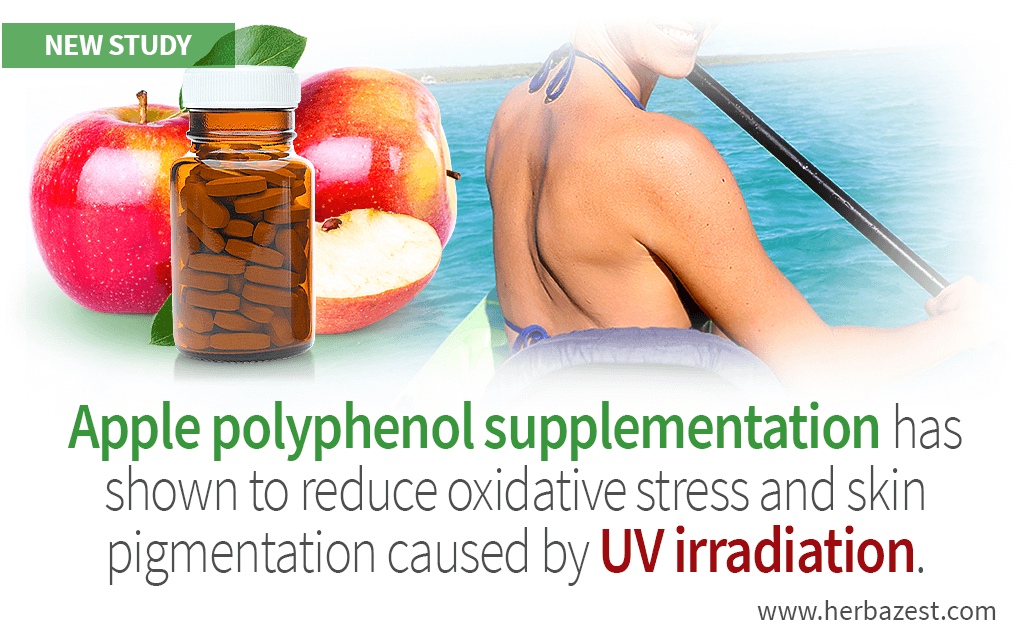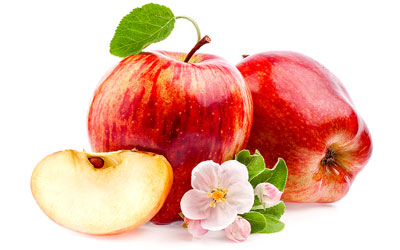Daily ultraviolet (UV) exposure from the sun causes oxidative stress that can result in various changes in skin tissue, such as sunburn, erythema, hyperpigmentation, cancer, and others.
Polyphenols, among other phytochemicals, have shown numerous benefits for improving skin conditions, including those triggered by UV exposure. Since apples are one of the best-known sources of polyphenols, they may potentially serve as a natural treatment for such abnormalities.1
This study aimed to evaluate the effects of apples' polyphenol supplementation on skin changes caused by UV irradiation.
The Study
The following study took place at the Dermis Research Center Co. in Osaka, Japan. It was a collaboration between researchers from various Japanese institutions, including Fukushima University and Food Research Institute, among others. The results were published in the 2020 edition of the Nutrients journal.
There were 65 women, aged 20-39, with skin photo-type II and III, participating in this 12-week trial. The inside parts of their upper arms were exposed to controlled solar-stimulated UV during the study.
Women were also assigned to three groups:
- Placebo group was given placebo tablets containing maltitol, agar, and sucrose esters of fatty acids.
- Intervention group 1 received tablets containing 300 mg/day apple polyphenols daily.
- Intervention group 2 received tablets containing 600 mg/day apple polyphenols daily.
Numerous parameters of skin changes were measured before, throughout, and after the study, including skin color changes, water content, and others.
The Results
The changes in erythema, or skin redness, values were significantly lower in both intervention groups in comparison to the placebo group, suggesting that polyphenols inhibited erythema formation after UV irradiation.
Changes in melanin (skin pigmentation) values were also substantially lower in the apple polyphenol groups than in the control group, suggesting protective abilities of the fruit's polyphenols against pigmentation.
No side effects were reported in either of the groups.
What Does this Mean?
This study clearly demonstrated that 12-week supplementation of apples' polyphenols can improve skin pigmentation caused by UV irradiation by protecting against oxidative stress.
Researchers attributed these benefits to the antioxidative properties of polyphenols in apples, more specifically procyanidins. These promising findings may lead to the development of new treatment formulations aimed at protecting the skin from UV radiation as well as reducing its damaging effects.
Other herbs rich in polyphenols include cacao, cloves, green tea, and blueberries.
Sources
- Nutrients, Administration of Apple Polyphenol Supplements for Skin Conditions in Healthy Women: A Randomized, Double-Blind, Placebo-Controlled Clinical Trial, 2020
Footnotes:
- Antioxidants. (2018). Polyphenolic Compounds Analysis of Old and New Apple Cultivars and Contribution of Polyphenolic Profile to the In Vitro Antioxidant Capacity. Retrieved October 9, 2020 from https://www.ncbi.nlm.nih.gov/pmc/articles/PMC5789330/





